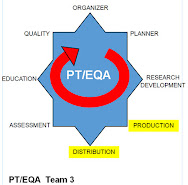This presentation is part 5 of a
series highlighting
Proficiency Testing as a Laboratory Quality Partner.
This series is put together by Dr. Michael A Noble BA MD FRCP the material founder and now retired chair of CMPT – Canadian (formerly Clinical) Microbiology Proficiency Testing Program. It is based on his national and international experience and expertise in Proficiency Testing (PT/EQA). Dr Noble continues on the advisory committee of CMPT and collaborates with other EQA programs including Oneworld Accuracy
Proficiency Testing (PT/EQA) is a Quality Partner, a program for laboratory Quality Assessment investigation and a foundational research base for learning about laboratory quality and laboratory error. It is also a business with employees and customers and maybe even investors.
The thing about businesses is that when they are organized correctly, they have a fair chance to succeed. When they are organized poorly, especially about customer service, their chances of succeeding become much more limited, even if they feel protected as a required service.
The reality is that when authorities and agencies receive enough complaints about poorly working programs, they can demand change, and programs can be dropped or replaced.
Customer needs and satisfaction has been well studied in many businesses. Noriaki Kano, an educator at the Tokyo University of Science was a consultant in quality management, and a pioneer in the arena of the customer satisfaction model. Kano developed what is known as the Kano model, a structure that describes meeting customer needs in three stages, (a) threshold (or must-be), (b) linear (or progressive), and (c) customer delight. For a more information, you may want to visit: https://www.medicallaboratoryquality.com/2018/03/how-happy-are-your-customers-and-how.html
Without going into detail, I offer my interpretation based on years of satisfaction surveys and our very short list of complaints of how laboratory customers view proficiency testing programs and in particular what represents not meeting the needs and what approaches customer delight. (See below).
Customer satisfaction is critically important in today’s post pandemic era, when businesses are struggling to hold on. If a business is unable to meet the basic needs of threshold satisfaction, customers are apt to move on to another solution.
In PT/EQA basic threshold satisfaction means getting test samples to the laboratory on-time, intact, and providing challenges that the laboratories consider both relevant and fair. If you tell the laboratory their samples will be arrive on Tuesday, they should arrive on Tuesday, and laboratories should get exactly what they ordered. And they also expect and their samples should be intact, and not broken or leaking. No surprises and no inconveniences.
Break that commitment more than once, and your organization has lost face and reputation and maybe a customer.
That is why Production and Distribution (Team 3) is so important. If the samples are liquid, you need to ensure that the vials you use are sealed and leak-proof. Packaging in most jurisdictions must meet specific regulations including absorbent material and sealed inner packaging to contain any leaks. And packaging has to remain secure even if exposed to moisture or if dropped, and may have to be marked with visible warnings if they are deemed as being potentially dangerous.
This is especially true if the contents could be classified as "dangerous goods".
Laboratories also expect the package to include specific
instructions about handling and testing the samples and demand safety information in case there
is a problem. Even if it seems that they don't read either of them, leaving them out is done at your peril.
Shippers have to be arranged well in advance and their waybill lists need to be completed accurately. And when the shipper tells you they will be there at 2PM in order to ensure your shipment will get shipped on-time, you better have everything prepared and ready to go well before 2PM. And never get the shipping address wrong.
If there are special instructions about where the package should be delivered and who is to be notified, that information must be available and apparent, or the package will get lost.
If these tasks seem basic, they indeed are, but if they are ignored, the risk of reputational and maybe even liability damage rises, and there is no one to blame, except yourself.
What may not seem apparent, these steps require close attention to detail. Putting these tasks in the hands of workers that don’t have that level of knowledge and focus and discipline puts your organization at risk. There probably are people in your team that skills of exacting nature and abilities. This is their place to shine. It is called matching tasks with talents, an important step in Employee Engagement.
Bluntly put, if your organization can’t get this right, you probably are in the wrong business.
In the next offering we will talk about achieving better and best customer satisfaction in PT/EQA.


No comments:
Post a Comment
Comments, thoughts...